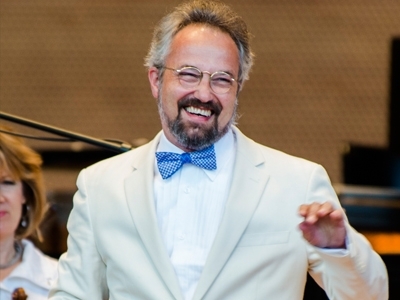Torke’s engaging “Book of Proverbs” gets Grant Park season on track

After a somewhat rough-edged opening night, the Grant Park Music Festival got quickly back in seasonal trim with a program that showed the lakefront summer concert series at its best.
Two contemporary American works were on the program with both composers in attendance. And Friday night’s concert by the Grant Park Orchestra at the Pritzker Pavilion marked the first appearance this summer of the Grant Park Chorus, who showed themselves in estimable form under the direction of chorus master Christopher Bell.
Michael Torke has enjoyed a long relationship with the Grant Park Festival. In 2009, Carlos Kalmar and the Grant Park Orchestra and Chorus gave the world premiere of Torke’s Plans, a work commissioned by the festival to mark the centennial of Daniel Burnham’s Plan of Chicago.
Torke’s Book of Proverbs was the main item on Friday’s program, a work the festival first performed in 2001. Written in 1996, Proverbs is cast on a large scale, running nearly 40 minutes and scored for orchestra, chorus and two soloists, drawing excerpts from the composer’s favored biblical book.
The orchestral introduction (“Opening”) is characteristic Torke, leading off with the composer’s brand of clean-lined dynamic energy. The seven sections that follow are primarily for chorus with a soprano and baritone soloist allotted one proverb each.
Torke’s chosen texts are often unlikely ones with a wry irony surfacing at times as in the extended mock-chauvinist “Drink Fill Our Love,” in which the baritone soloist and men of the chorus caution of the wiles of an adulterous woman. Often the music clangs with the text, as with the lovely warm melody for “Like the man who seizes a passing dog by the ears,” with a text that recalled the famously disturbing photo of Lyndon Johnson and his canine. And it’s unlikely anyone has ever set such euphonious music to the words, “As the dog returns to his vomit, so the fool repeats his folly”
Musically, Torke adopts a rigorous system for his short stanzas with each word always attached to the same note; he then scrambles the words in various orders before reprising the original full text.
That often makes the words into gibberish, but Torke’s music is so consistently engaging it doesn’t matter. Much of the music is built on snappy rhythmic fragments, with the words alternated by the choral sections in shifting meters and accents. The deployment of music between the orchestra and chorus is skillfully done and conductor Kalmar ensured fine transparency and clear textures throughout.
Highlights included “Better a Dry Crust” with its expression of peaceful amiability as sung by the women of the chorus. That was immediately contrasted by the wooden clappers of “The Whip for the Horse,” as the men sing of the harsh punishment awaiting recidivist sinners.
The soloist were both excellent. Alisa Jordheim displayed a slender, yet luminous soprano in “The Way of an Eagle,” backed by the women in the chorus singing of life’s mysteries.
Tyler Duncan possesses a striking instrument, as shown in “Drink Our Fill of Love.” The Canadian baritone sang with robust yet refined tone in his solo warning of the enticements of adulterous women.
Book of Proverbs closes in rousing fashion with the full chorus singing the text, “Boast Not of Tomorrow,” which seems invested with topical resonance as a timely admonition to mendacious politicians. The audience warmly applauded the composer, Kalmar, the soloists, orchestra and chorus in this polished and dedicated performance.
The evening led off with Whisper, Echo, A Cry by Aaron Jay Kernis. Composed as a kind of anti-fanfare for the San Antonio Symphony’s 75th anniversary in 2014, the six-minute work balances pensive, dark-hued brooding with more agitated sections. Dotted brass fragments present a veiled quasi-fanfare motif in the background, as this restless, unsettled music builds inexorably to an emphatic tutti before a quiet coda. Kernis’s work is characteristically well-crafted and effective and Kalmar led an ardent and committed performance.
Beethoven’s Symphony No. 1 was a graceful centerpiece between the pair of homegrown works. Kalmar led a fresh and spirited performance that made this familiar music sparkle anew. The Andante was winning, lilting and gracious with alert dynamic marking that always felt organic.
The finale proved especially delightful. The jokey opening—where Beethoven presents the main theme’s ascending notes slowly and tentatively one by one, until the full theme is quickly whipped off—was simply terrific, thrown off by Kalmar and the orchestra in fleet, vivacious fashion, with every witty turn and dynamic rimshot making an impact.
The program will be repeated 7:30 p.m. Saturday. gpmf.org
Posted in Performances

